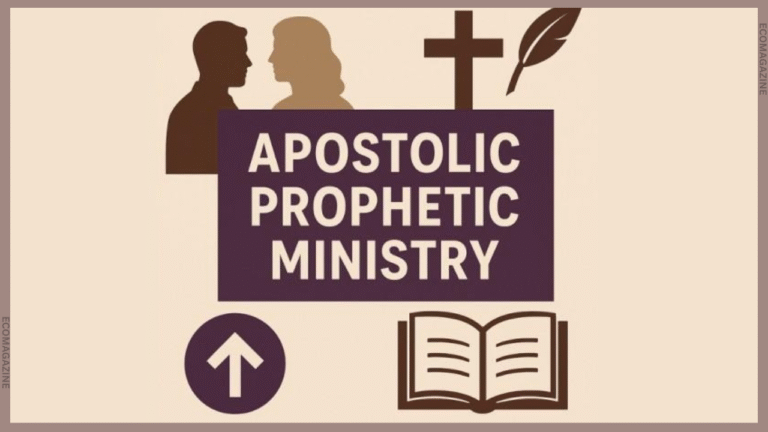The early church grew not from preaching leaders that proclaimed the gospel to the disciples and church, but through the ones who made decisions, directed others, and had direct revelation of God. Apostles initiated the new works of God and laid the foundation. Prophets declared the heart of God to the church, declaring correction, prophetic vision, direction, encouragement, and strength. Apostolic and prophetic leaders formed what we would recognize as apostolic prophetic ministry.
This is not an idea of a trend or of the ancient history of the church. This is a God-ordained way of leading that empowers believers, blesses the community, and works with God for the church to grasp the opportunities and meet the challenges of a changing world with wisdom and spiritual authority. The building the builders ministry continues to extend this biblical leadership model today.
Understanding Apostolic Prophetic Ministry
Apostolic prophetic ministry is a biblically grounded leadership paradigm. That focuses on recovering and re-engaging two key roles in the church: apostles and prophets. This ministry is rooted in New Testament teaching, particularly Ephesians 4:11-13. To train believers and strengthen the spiritual basis of the church.
- An apostle is a foundational leader, a visionary. Who is sent to pioneer new geographical and cultural contexts for ministry, to plant new churches. And establish new structures for sustaining growth. Apostles are strategic integrators who lay down both the spiritual and organizational foundations for the flourishing of the church.
- A prophet speaks on behalf of God by providing insights, encouragement, correction, and revelation. They keep the church sensitive to God’s guidance and help. It to continue moving in covenant with God’s divine intent and purpose.
Together, they work toward a balance of governance or guidance. Both elements are necessary to hold together a church that is both grounded and guided by God in its movement.
Why Apostolic Prophetic Ministry Matters Today
In contemporary culture, the church faces many roadblocks. Apostolic prophetic ministry meets several needs as follows:
- Restoring the Biblical Order of Leadership: In the first century, the Church was full of apostles, prophets, evangelists, pastors, and teachers, all of whom were essential for a healthy church and were functioning in health and growth.
- Facilitating Spiritual Maturity: Believers are trained and equipped to discover and activate their gifts and ministries that build faith, release unity, and facilitate discipleship and spiritual maturity in others. This creates spiritual maturity beyond numbers and develops followers of Jesus who are ready for Kingdom assignments.
- Creating Unity in Diversity: Apostolic prophetic ministry transcends denominational boundaries, leading to cooperative efforts and a shared vision among many different Christian bodies.
- Equipping for Strategic Spiritual Warfare: Apostolic prophetic leaders combine prayer, discernment, and revelation to take back spiritual territory, confront cultural strongholds, and build a New Testament approach to spiritual authority as a model for today’s world.
The Apostolic Christian Church and Its Role
The tradition of the apostolic Christian church has historically provided a public demonstration of apostolic prophetic ministry in practice. This stream has biblical authority, spiritual accountability, and community at its core, and recognizes that apostles and prophets are indispensable gifts to the church for their governance and spiritual health. In this tradition:
- Apostolic leadership will provide governance, vision, and structure.
- Prophetic ministry will provide spiritual alignment and grace-filled correction.
- The community will provide maturity and readiness for missions based on biblical truth.
This tradition has provided a tested model of how apostolic prophetic ministry can support the health of the church and prepare believers to engage spiritually and culturally with authority.
Apostolic Prophetic Ministry’s Broader Impact
Apostolic prophetic ministry extends beyond the four walls of the church; it has a cultural aspect as well. Leaders taught and trained in those offices will impact areas of society such as education, government, media, arts, and business. This aligns with ideas such as the Seven Mountains Mandate, which is all about positioning the church to disciple and influence the major areas that shape society.
Family of churches engaged in apostolic prophetic ministry re-contextualize their churches as centers of spiritual empowerment that:
- Equip believers to engage at a workplace and a societal level
- Mobilize intercessory prayer to dismantle cultural and spiritual strongholds
- Invite prophetic wisdom and strategy for social change
Conclusion
Apostolic prophetic ministry is more than just a leadership structure; it is a biblically based strategy for establishing a healthy, united, and mission-oriented church. In re-establishing apostolic and prophetic order, they can take on the complexity of today’s culture while remaining grounded in God’s purposes.
Organizations such as The Merge are at the forefront of this mission. They are doing this by serving as equipping centers, embodying the vision of building the builders ministry by raising and releasing leaders to equip the apostolic Christian church globally for years to come.


